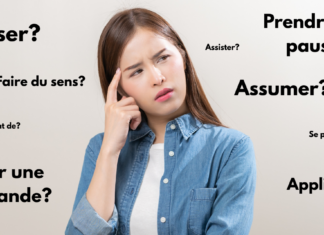Did you notice how French people are always using filler words in their conversation? Sure, English people do the same, like, pretty often, you know… While learning French, should you avoid these French filler words at all cost? Or should you embrace them? When you think about it, filler words are a big part of the modern language. Here are some of the most used French filler words.
Let’s forget about the most well-known filler words, like “euh” (that you can translate as “uh” in English) or “hein”.They don’t really mean anything and are mostly used when you need time to think about what you’re going to say. But there are filler words that are almost used as punctuation or that French people add automatically at the end of a sentence.
Why French Filler Words Might Be Interesting to Use
Filler words are truly fascinating. Why? Mostly because they are very versatile. Some French filler words are introductory, transitional words (“du coup”, “voilà”, “tu vois”, “quoi”), ready-made expressions (“j’avoue”, “pas de soucis”, “c’est clair”) or even new uses of existing words. These tiny words can make all the difference between a very scholastic conversation and a more natural laid back conversation.
If you want to focus your language classes on conversation, you will have to learn more about these filler words because they are a big part of the language. Firstly, filler words can be a big help when you’re speaking with someone while trying to find the right words. Using them is a good way to make sure you still have the attention of the person you’re talking with. Secondly, it allows you to be part of a social group.
Don’t be the one who judges badly this linguistic evolution. Maybe you are using filler words yourself, without even realizing it. So, embrace it and learn some of the most used French filler words.

French Filler Words to Know (And Maybe Use)
Du coup
How do you recognize a French person who freshly arrived in Québec? Well, they always add “du coup” in their sentences… Quebecers often make fun of French people for this filler word, but to be honest, they also use the word “faque”.
What does “du coup” mean? You could translate it as “thus” or “so”, even though French people also like to use it as punctuation… But this French filler word is clearly one of the most used and the most recognizable.
Genre
“Il était bizarre, genre il voulait pas me lâcher…” (He was weird, like he didn’t want to let me go…) Just like “du coup”, the filler “genre” can be used at the beginning of a sentence, but also in the middle or at the end. You could translate it by “like” or “kind of”.
And, surprise! You can also use it on its own. If someone tells you something incredible or hard to believe, you can just answer by saying “genre !”.
T’as vu
Don’t be fooled by this one. It looks like the beginning of a question : “T’as vu le match hier ?” (Did you watch the game yesterday?) but it’s much more than that. This French filler word is a slang word used by young people to end sentences. It was very popular in the 2000s to emphasize what you just said.
C’est clair
When someone is telling you a story, a fact or explaining an argument and you agree with him/her, just answer “C’est clair”.
Grave
Even though the word “grave” can be translated as “serious” or “severe”, as a filler word it has the same significance as “c’est clair”. Which means you can use it to strongly agree with someone.
“Il était vraiment bien ce film !
– Grave !”

J’avoue
Just like “C’est clair” et “grave”, the word “j’avoue” is one of the French filler words that you can use alone. Originally, it means “I confess” or “I admit”, but it has become a way to agree with someone or to react to a controversy.
Carrément
What about another word to express your agreement? Are you really surprised that French people have so many words to agree and disagree, even though they are well known to complain and loudly express opinions? So, feel free to use “carrément” to reply to your friend’s banter about a new work colleague.
“Tu trouves pas qu’elle est bruyante ?
– Carrément.”
Quoi
Be careful with this interrogative pronoun. It can be used in various situations : to ask a question, to express surprise or even to punctuate a sentence. You might feel like French people over use it… You would be right.
“Il est un peu collant, enfin tu vois quoi…”
Trop pas
You have to be careful with this one. “Trop pas” is grammatically incorrect, since you would rather say “pas trop” (not too much). And yet, it’s used between young people instead of the traditional “no”. Keep in mind, it’s used to really emphasize the negation…
“Tu l’aimes bien ?
-Trop pas !”
Bref
After the annoying “du coup”, the word “bref” might be one of the most famous French filler words. It’s used to conclude an explanation, like you would use “in short”. But French people didn’t realize how much they were using it until 2011 and the French television series “Bref” created by Kyan Khojandi. In the short episodes, the main character tells one of his current problems, and summarizes everything at the end by saying “Bref”.
“Bref, il y a des gens qui m’énervent.”
Sérieux
Why so serious? The word “sérieux” is mainly used in French slang to express surprise, or at the beginning of a sentence to insist on an issue.
“Sérieux, il est insupportable aujourd’hui.”
Bon ben
It looks like two random sounds put together. And it can’t really be translated! But you can use it when you want to say “alright then” or “ok well”. Most of the time, French people use it to end a conversation when they need to go.
“Bon ben j’y vais, à demain!”
In short, these French filler words are often seen as bad French by language purists… But it would be a shame to put these words aside since they are part of the French culture. Many French people use them, even when they don’t realize it. If you want to avoid them, fine. But you should at least be able to recognize them during a conversation with French people. It will help you feel included. Embrace the French slang!












